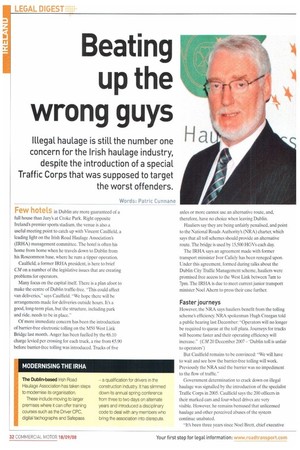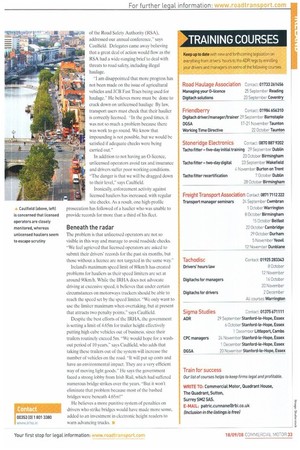Beating up the wrong guys
Page 32

Page 33

If you've noticed an error in this article please click here to report it so we can fix it.
Illegal haulage is still the number one concern for the Irish haulage industry, despite the introduction of a special Traffic Corps that was supposed to target the worst offenders.
Words: Patric Cunnane
Few hotels in Dublin are more guaranteed of a full house than Jury's at Croke Park. Right opposite Ireland's premier sports stadium, the venue is also a useful meeting point to catch up with Vincent Caulfield, a leading light on the Irish Road Haulage Association's (IRHA) management committee. The hotel is often his home from home when he travels down to Dublin from his Roscommon base, where he runs a tipper operation.
Caulfield, a former IRHA president, is here to brief CM on a number of the legislative issues that are creating problems for operators.
Many focus on the capital itself. There is a plan afoot to make the centre of Dublin traffic-free. "This could affect van deliveries,says Caulfield. -We hope there will be arrangements made for deliveries outside hours. Its a good, long-term plan, but the structure, including park and ride, needs to be in place."
Of more immediate concern has been the introduction of barrier-free electronic tolling on the M50 West Link Bridge last month. Anger has been fuelled by the €6.10 charge levied per crossing for each truck, a rise from €5.90 before barrier-free tolling was introduced. Trucks of five axles or more cannot use an alternative route, and, therefore, have no choice when leaving Dublin.
Hauliers say they are being unfairly penalised, and point to the National Roads Authority's (NRA) charter, which says that all toll schemes should provide an alternative route. The bridge is used by 15,500 HGVs each day.
The IRHA says an agreement made with former transport minsister Ivor Callely has been reneged upon. Under this agreement, formed during talks about the Dublin City Traffic Management scheme, hauliers were promised free access to the West Link between 7am to 7pm. The IRHA is due to meet current junior transport minister Noel Ahern to press their case further.
Faster journeys However, the NRA says hauliers benefit from the tolling scheme's efficiency. NRA spokesman Hugh Creegan told a public hearing last December: "Operators will no longer be required to queue at the toll plaza. Journeys for trucks will become faster and their operating efficiency will increase." (CM 20 December 2007 'Dublin toll is unfair to operators') But Caulfield remains to be convinced: "We will have to wait and see how the barrier-free tolling will work. Previously the NRA said the barrier was no impediment to the flow of traffic."
Government determination to crack down on illegal haulage was signalled by the introduction of the specialist Traffic Corps in 2005. Caulfield says the 200 officers in their marked cars and four-wheel drives are very visible. However, he remains bemused that unlicensed haulage and other perceived abuses of the system continue unabated.
of the Road Safety Authority (RSA), addressed our annual conference," says Caulfield. Delegates came away believing that a great deal of action would flow as the RSA had a wide-ranging brief to deal with threats to road safety, including illegal haulage.
"I am disappointed that more progress has not been made on the issue of agricultural vehicles and JCB Fast Tracs being used for haulage." He believes more must be done to crack down on unlicensed haulage By law, transport users must check that their haulier is correctly licensed. "In the good times, it was not so much a problem because there was work to go round. We know that impounding is not possible, but we would be satisfied if adequate checks were being carried out."
In addition to not having an 0-licence, unlicensed operators avoid tax and insurance and drivers suffer poor working conditions. "The danger is that we will be dragged down to their level," says Caulfield.
Ironically, enforcement activity against licensed hauliers has increased, with regular site checks. As a result, one high-profile prosecution has followed of a haulier who was unable to provide records for more than a third of his fleet.
Beneath the radar The problem is that unlicensed operators are not so visible in this way and manage to avoid roadside checks. "We feel agrieved that licensed operators arc asked to submit their drivers' records for the past six months, but those without a licence are not targeted in the same way."
Ireland's maximum speed limit of 80kmfh has created problems for hauliers as their speed limiters are set at around 90km/h. While the IRHA does not advocate driving at excessive speed, it. believes that under certain circumstances on motorways truckers should be able to reach the speed set by the speed limiter. "We only want to use the limiter maximum when overtaking, but at present that attracts two penalty points," says Caulfield.
Despite the best efforts of the IRHA, the government is setting a limit of 4.65m for trailer height effectively putting high cube vehicles out of business, since their trailers routinely exceed 5m. "We would hope for a washout period of 10 years," says Caulfield, who adds that taking these trailers out of the system will increase the number of vehicles on the road. "It will put up costs and have an environmental impact. They are a very efficient way of moving light goods." He says the government faced a strong lobby from Irish Rail, which had suffered numerous bridge strikes over the years. "But it won't eliminate that problem because most of the bashed bridges were beneath 4.65m!"
He believes a more punitive system of penalties on drivers who strike bridges would have made more sense, added to an investment in electronic height readers to warn advancing trucks. E












































































































































































